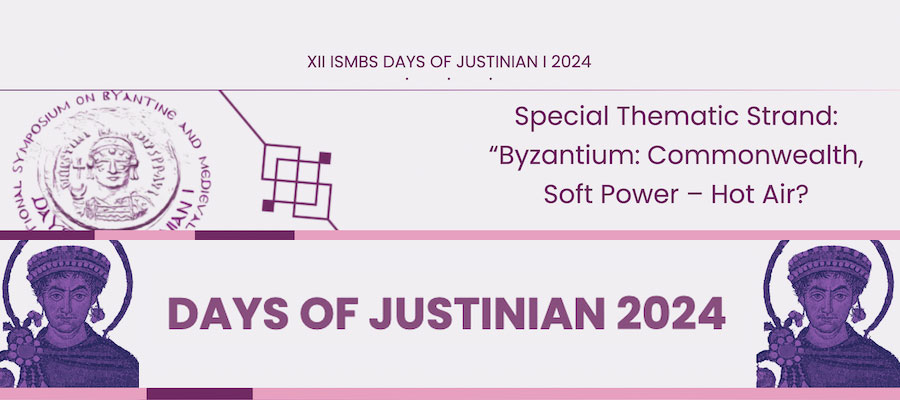XII International Symposium on Byzantine and Medieval Studies "Days of Justinian I", Skopje, November 1–3 , 2024
The International scientific symposium "Days of Justinian I" is an annual interdisciplinary scholarly forum aimed at the presentation of the latest research followed by discussions on various aspects of Byzantine and Medieval Studies before 1500; this includes the treatment and interpretation of cultural, historical and spiritual heritage in contemporary modern Europe. The Symposium is dedicated to Emperor Justinian I with the aim to bring together scholars from around the world to address a broad range of issues related to Byzantium and the European Middle Ages, comprising the exploration of the cultural and historical legacy as an integrative component of the diversities and commonalities of Europe and wider.
The special thematic strand for 2024 is Byzantium: Commonwealth, Soft Power – Hot Air?
Dimitri Obolensky’s vision of a ‘Commonwealth’ encompassed those polities and cultures whose elites accepted and adapted Christian doctrine, rites and normative texts from the imperial-ecclesiastical complex in Constantinople. This could be seen as a form of ‘Soft Power’, a term coined at the time of the spread of American culture through consumerism, mass-entertainment, and normative institutions in the twentieth century. We welcome critiques and revisions of the concept, alongside comparisons with other ‘empires’ shading into ‘commonwealths’ and vice versa – for example, the ‘Holy Roman’ and British empires, Kyivan Rus, or indeed the Polish-Lithuanian Commonwealth. Might a conceptual update of Obolensky’s Commonwealth be the ‘Variable-Geometry-Empire’, exercising varying degrees of control, shifting geographically but also extraterritorially, in terms of political, personal, and religious networks? ‘Commonwealth’ might even be applied to internal affairs: behind its insistently classicising façade, was Byzantium itself more of a Commonwealth than homogeneous unitary state? Should one see the imperial-ecclesiastical complex’s outreach mainly in terms of a ‘Family of Princes’, a matter of political and religious elites? Or was there down-reach to much broader social strata? And how far did persons, texts, imagery and ideas circulate around the Commonwealth, regardless of the imperial leadership’s directions or wishes? Archaeological evidence, museum artefacts and visual imagery may help us answer these latter questions.
We welcome papers addressing any of these broad themes, specific topics or questions. Interdisciplinary offerings are also welcome.
Presentation of the papers will be limited to 10 minutes. Working languages: Macedonian and English.
Please note that the Organizing Committee will organize hybrid sessions with physical presence and online presentations for remote participation.
Organized by the Institute of National History, Ss. Cyril and Methodius University in Skopje and University of Bologna, in partnership with Faculty of Theology "St. Clement of Ohrid" in Skopje
